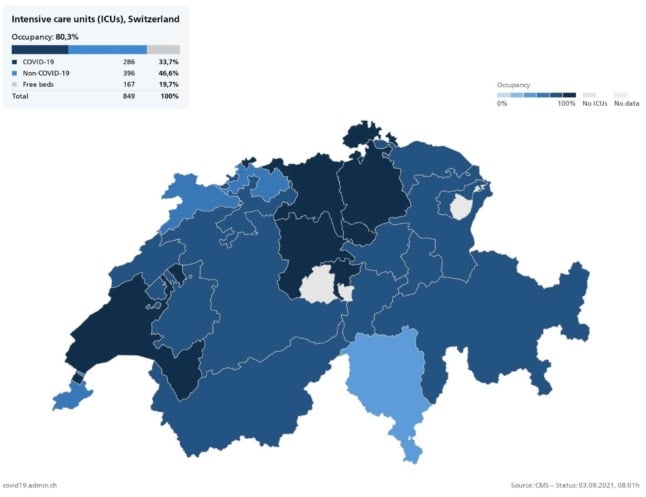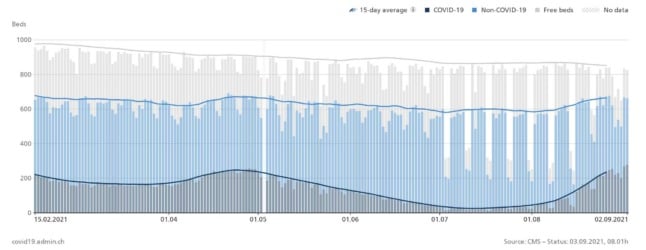Why does Switzerland have the most Covid-related ICU admissions in Europe?

Switzerland’s hospitals have more Covid-related ICU admissions than any other European country on a per capita basis. Why?
Several hospitals across the country have indicated they are at capacity, with surgeries and other non-emergency operations postponed, mirroring the scenes from the early stages of the pandemic.
Latest figures indicate that 81 percent of the country’s ICU beds are full, with half of those in intensive care admitted due to Covid-related illnesses.

On a state by state breakdown, only one Swiss canton has an ICU capacity lower than 50 percent: Ticino.
The capacities have hit 100 percent in Nidwalden and Schaffhausen, while it is above 90 percent in Aargau, Basel City and Vaud.
The following image shows how this has developed over time, with ICU admissions rising steadily since the start of August.

The majority of those in the ICU are unvaccinated, Swiss media reports.
As reported by The Local Switzerland in early August showed that people who had been vaccinated had less than a 0.01 percent chance of getting infected, or a 0.002 percent chance of being hospitalised.
UPDATE: What is the risk of catching Covid and getting sick in Switzerland if you are vaccinated?
How does this compare with other countries?
Per million inhabitants, there are 34.8 people in ICU in Switzerland.
This is higher than France (33.7) and Spain (31.9), while most European countries have much lower admission rates.
In neighbouring Austria, which is similar to Switzerland in population size and wealth, there are just 12.5 people in ICU per million inhabitants.
Balkan countries have not been considered in the report.
Why are Switzerland's ICUs so full?
Many have asked why ICU admissions are highest on the continent, despite Switzerland’s world-class healthcare system.
Two likely reasons are the country’s lagging vaccination rate and the relatively relaxed measures in effect to prevent the spread of the virus, Switzerland’s Tages Anzeiger reported on Saturday.
According to the paper, “Switzerland does not really have the situation under control at the moment”.
Despite plentiful supplies of vaccine doses for several months, Switzerland lags behind much of Europe when it comes to vaccinations.
As at September 5th, just 51 percent of the Swiss public is fully vaccinated.
That compares with 59 percent of the EU, 60 percent of Germany, 61 percent in France and 63 percent in the UK.
Switzerland also has also seen more significant protests and demonstrations by vaccine sceptics and Covid deniers since the start of the pandemic - and particularly since the vaccines were rolled out.
Covid-19 vaccines: Why is Switzerland lagging behind other EU countries?
Switzerland’s measures to combat the spread of the virus are also far less stringent than those seen in most of Europe.
While much of the continent - including Switzerland’s neighbours - have restricted events, bars, restaurants and gyms to people who have tested negative, been vaccinated or recently recovered from the virus, Switzerland’s only restrictions have been for events with more than 1,000 attendees and for travel.
This is evidenced by the higher case rate in Switzerland, where confirmed cases (324 per million inhabitants) is behind only the UK (557) and Ireland (359).
The Swiss government is pushing for stricter measures - including requiring the Covid certificate in bars, gyms, restaurants and at private events - although this plan has been delayed.
READ MORE: When will Switzerland decide whether to enforce the Covid certificate in restaurants?
Comments
See Also
Several hospitals across the country have indicated they are at capacity, with surgeries and other non-emergency operations postponed, mirroring the scenes from the early stages of the pandemic.
Latest figures indicate that 81 percent of the country’s ICU beds are full, with half of those in intensive care admitted due to Covid-related illnesses.

On a state by state breakdown, only one Swiss canton has an ICU capacity lower than 50 percent: Ticino.
The capacities have hit 100 percent in Nidwalden and Schaffhausen, while it is above 90 percent in Aargau, Basel City and Vaud.
The following image shows how this has developed over time, with ICU admissions rising steadily since the start of August.

The majority of those in the ICU are unvaccinated, Swiss media reports.
As reported by The Local Switzerland in early August showed that people who had been vaccinated had less than a 0.01 percent chance of getting infected, or a 0.002 percent chance of being hospitalised.
UPDATE: What is the risk of catching Covid and getting sick in Switzerland if you are vaccinated?
How does this compare with other countries?
Per million inhabitants, there are 34.8 people in ICU in Switzerland.
This is higher than France (33.7) and Spain (31.9), while most European countries have much lower admission rates.
In neighbouring Austria, which is similar to Switzerland in population size and wealth, there are just 12.5 people in ICU per million inhabitants.
Balkan countries have not been considered in the report.
Why are Switzerland's ICUs so full?
Many have asked why ICU admissions are highest on the continent, despite Switzerland’s world-class healthcare system.
Two likely reasons are the country’s lagging vaccination rate and the relatively relaxed measures in effect to prevent the spread of the virus, Switzerland’s Tages Anzeiger reported on Saturday.
According to the paper, “Switzerland does not really have the situation under control at the moment”.
Despite plentiful supplies of vaccine doses for several months, Switzerland lags behind much of Europe when it comes to vaccinations.
As at September 5th, just 51 percent of the Swiss public is fully vaccinated.
That compares with 59 percent of the EU, 60 percent of Germany, 61 percent in France and 63 percent in the UK.
Switzerland also has also seen more significant protests and demonstrations by vaccine sceptics and Covid deniers since the start of the pandemic - and particularly since the vaccines were rolled out.
Covid-19 vaccines: Why is Switzerland lagging behind other EU countries?
Switzerland’s measures to combat the spread of the virus are also far less stringent than those seen in most of Europe.
While much of the continent - including Switzerland’s neighbours - have restricted events, bars, restaurants and gyms to people who have tested negative, been vaccinated or recently recovered from the virus, Switzerland’s only restrictions have been for events with more than 1,000 attendees and for travel.
This is evidenced by the higher case rate in Switzerland, where confirmed cases (324 per million inhabitants) is behind only the UK (557) and Ireland (359).
The Swiss government is pushing for stricter measures - including requiring the Covid certificate in bars, gyms, restaurants and at private events - although this plan has been delayed.
READ MORE: When will Switzerland decide whether to enforce the Covid certificate in restaurants?
Join the conversation in our comments section below. Share your own views and experience and if you have a question or suggestion for our journalists then email us at [email protected].
Please keep comments civil, constructive and on topic – and make sure to read our terms of use before getting involved.
Please log in here to leave a comment.